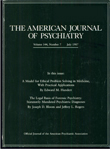Anorexia Nervosa in One Monozygotic Twin
Ms. A, the proband, was 45 years old when she was examined for delirium after surgery. She is married, has two children, and works as a specialized practitioner. She developed anorexia nervosa at the age of 15 years, after going on a diet, without initial overweight. Her weight fell from 45 to 33 kg (height=1.60 m; body mass index=12.9). She had amenorrhea for more than 5 years and regularly used laxatives and engaged in self-induced vomiting.
In an interview with the twin sister, a married woman with two children, a simple phobia was the only disorder detected. Nevertheless, the sister is greatly concerned about her body image and cannot stand eating any food associated with milk. She has frequent periods of dieting when she eats only vegetable soups for days. Her weight fluctuates precisely between 47 and 50 kg (height=1.60 m; body mass index=18.4–19.5). She explained that she was shocked that her sister developed anorexia nervosa and therefore decided to watch her weight in order to avoid having it fall below 47 kg, the weight at which her twin sister began to lose control of her eating behavior.
References
Information & Authors
Information
Published In
History
Authors
Metrics & Citations
Metrics
Citations
Export Citations
If you have the appropriate software installed, you can download article citation data to the citation manager of your choice. Simply select your manager software from the list below and click Download.
For more information or tips please see 'Downloading to a citation manager' in the Help menu.
View Options
View options
PDF/EPUB
View PDF/EPUBGet Access
Login options
Already a subscriber? Access your subscription through your login credentials or your institution for full access to this article.
Personal login Institutional Login Open Athens loginNot a subscriber?
PsychiatryOnline subscription options offer access to the DSM-5-TR® library, books, journals, CME, and patient resources. This all-in-one virtual library provides psychiatrists and mental health professionals with key resources for diagnosis, treatment, research, and professional development.
Need more help? PsychiatryOnline Customer Service may be reached by emailing [email protected] or by calling 800-368-5777 (in the U.S.) or 703-907-7322 (outside the U.S.).

